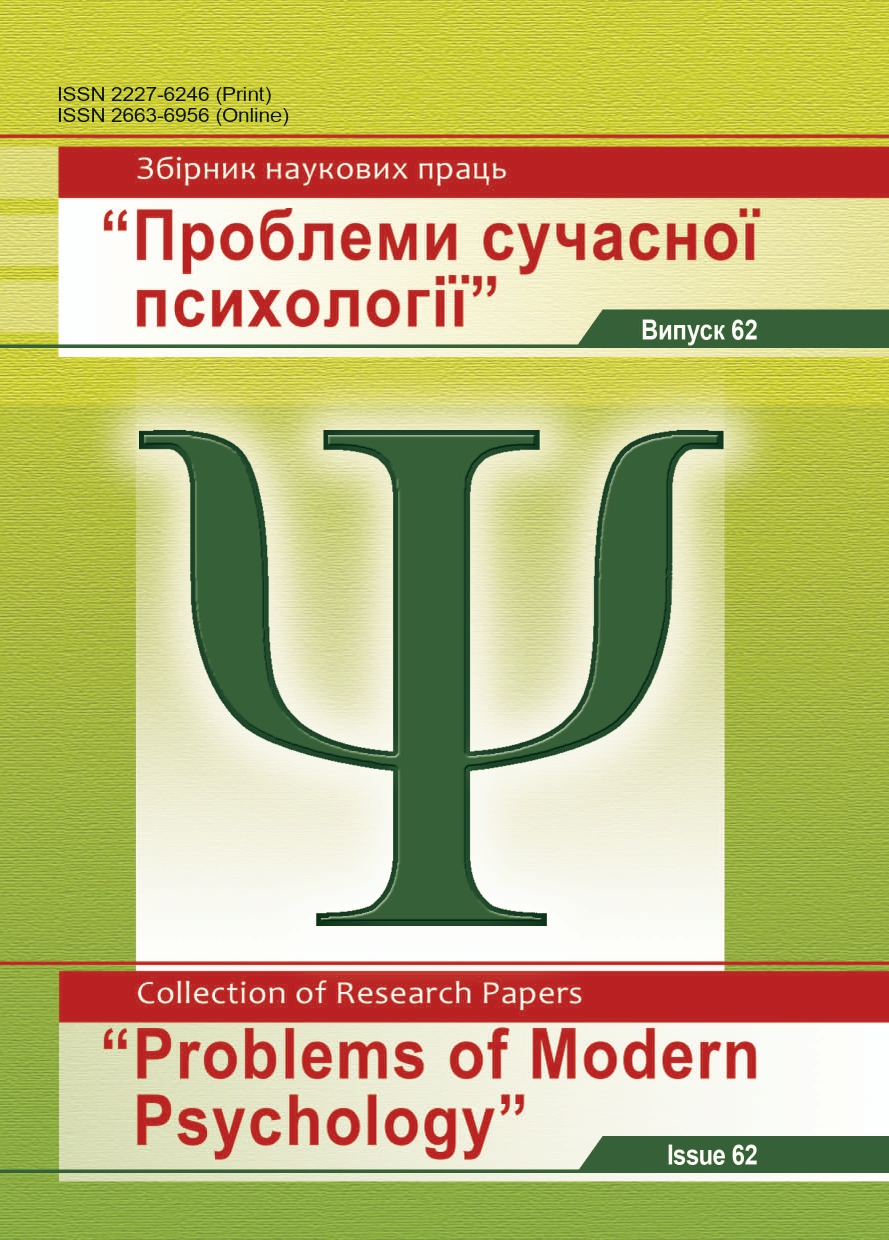Personality’s Self-Worth as a Resource Process and State
DOI:
https://doi.org/10.32626/2227-6246.2023-62.166-185Keywords:
sense of self-worth, self-worth as a resource process and state, psychological resources, structural model of self-worth, self-worth as an existential factAbstract
The aim of the article is to characterize the resource content of a personality’s sense of self-worth in empirical way.
Methods. The study was implemented according to Bayer’s model, which involves transforming the problem into the form in which it will have a solution, and enables the practical application of the results. In the empirical study, ten psychological questionnaires were used, which made it possible to determine the following types of psychological resources of a person in empirical way: personal resources, interpretive psychological resources, existential resources, “strengths of character” resources, motivational resources, resources of the psychological survival, uncertainty tolerance resources, resources of relationship, coherence. The sense of self-worth was empirically determined according to the “self-worth” scale of the Existence Scale method by A. Lengle. The following methods of mathematical and statistical analysis were applied: predictor analysis and analysis of “causes and effects” to characterize self-worth as a process, multifactor and cluster analysis as a state.
Research results. According to the analysis of predictors, self-worth trends are determined by two resources – the psychological resource of “responsibility” and the existential resource of “belief”; according to the results of the analysis of “causes and effects”, self-worth is the effect of two resources – the psychological resource of “responsibility” and the existential resource of “belief”; the structural resource model of self-worth is three-factor: factor 1 – resources of “strengths of character”, “desire to be involved in a common cause” and “sensitivity in relationships”; factor 2 – interpretive psychological resources of “the intention of wisdom”; factor 3 – existential resource of “belief”; according to the results of the cluster analysis, the sense of self-worth and the existential resource of faith belong to the same cluster.
Conclusions. The study’s results make it possible to confirm self-worth empirically as an existential reality of the personality, manifested in the ability to be free and make choices according to one’s values and beliefs. The phenomenon of self-worth should be characterized not only through its importance in the achievement of virtues by a person but because of explanation of the reasons for predicting one’s own harmony. The resource content of self-worth makes it possible to characterize it as a process of self-discovery and reinterpretation of the meaning of events, enabling non-repetition of decisions recognized as erroneous and a state of free choice.
Downloads
Published
How to Cite
Issue
Section
License
Copyright (c) 2023 Shtepa Olena

This work is licensed under a Creative Commons Attribution-NonCommercial 4.0 International License.
Copyright
The Editorial Board has the full right to publish original scientific papers containing results of theoretical and experimental research works which are not currently subject to review for publication in other scientific editions. The Author shall transfer to the editorial board of the Collection the right to spread the electronic version of the paper, as well as the electronic version of the paper translated into English (for papers originally submitted in Ukrainian and Russian) by all kinds of electronic means (placement at the official website of the Collection, electronic databases, repositories etc).
The Author of an article reserves the right to use materials of the paper, without approval with the editorial board and the founders of this Collection: a) partially or fully, for educational purposes; b) for writing own dissertation papers; c) for preparation of abstracts, conference reports and presentations.
The Author of an article can place electronic copies of the paper (including the final electronic version downloaded from the official website of the Collection) at:
- personal web resources of all Authors (websites, webpages, blogs etc.);
- web resources of the institutions where the Authors are employed (including electronic institutional repositories);
- non-profit public access web resources (for example, arXiv.org).
But in all cases, it is obligatory to have a bibliographic reference to the paper, or a hyperlink to its electronic copy placed at the official website of this Collection.






